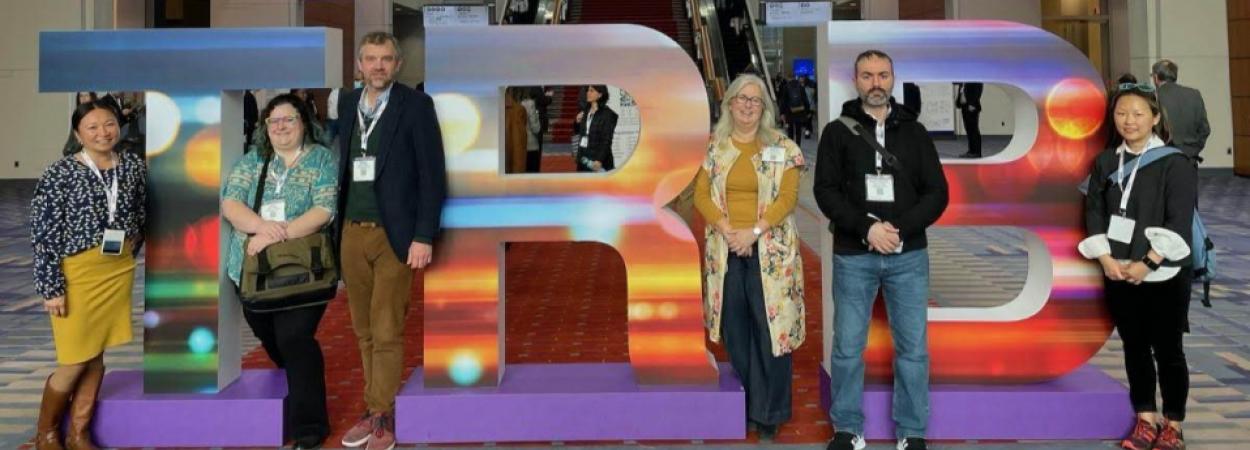The 103rd annual meeting of the Transportation Research Board (TRB) will be held January 7–11, 2024 in Washington, D.C., and Portland State University transportation faculty and researchers will be sharing their expertise in 15 sessions at the world's largest transportation conference. The TRB annual meeting attracts thousands of transportation professionals from around the globe to address transportation policy, practice, and plans for the future.
VIEW THE ONLINE GUIDE TO PSU AT TRB
Some highlights from the PSU Program
Sunday, January 7 - Bicycle and Pedestrian Data Fusion: Learning from Each Other
Sirisha Kothuri of Portland State University will present in this workshop, sharing "Exploring Data Fusion Techniques to Estimate Network-Wide Bicycle Volumes."
Traditional bicycle counters can provide data for limited sections of the bike network, often these counters are installed at important locations like trails or bridges. While limited in location, they count everyone who bikes by. Meanwhile, GPS & mobile data cover the entire transportation network, but that data only represents those travelers who are using smartphones or GPS. Combining the traditional location-based data sources with this new, crowdsourced data offers better accuracy than any could provide alone. This project drew data from Location Based Services (LBS), app, and bike share, as well as more traditional infrastructure and socio-demographic datasets. Learn more about the project.
Tuesday, January 9 - Pedestrian Accessibility, Walkability, and Design
Kyuri Kim, a PhD student in urban planning at the Nohad A. Toulan School of Urban Studies and Planning and a Graduate Reseach Assistant working with advisor Jennifer Dill, will present "Under the Influence of Parents: A Longitudinal Study of Children’s Walking" in this poster session.
Many researchers have studied children's active travel; however, they have mostly been cross-sectional studies dealing with commuting to school and parental perceptions and attitudes. To find ways to promote children's active travel, this longitudinal study uses panel data (two time periods) to examine how parents' actual walking and safety perception correlated with children’s walking. This study is meaningful in finding the relationships between the attitudes and behaviors of parents’ and children's walking.
Tuesday, January 9 - Freight Demand and Choice Modeling Using Advanced Data Sets
Michael Bronson, a graduate student in the Maseeh College of Engineering and Computer Science, will present "Exploratory Analysis of Factors Affecting Home Delivery Returns" along with his advisor, Miguel Figliozzi, and co-authors Ali Riahi Samani and Sabyasachee Mishra (University of Memphis).
E-commerce and house deliveries have experienced a rapid growth in the last two decades. The return of online shopping products is a side effect of online shopping that has not been properly studied in the transportation literature. This research answers two novel research questions:
(i) What household characteristics are associated with a higher or lower propensity to return online purchases?
(ii) What type of products contribute to positive return delivery rates?
The results indicate that the number of online purchases, the percentage of fashion and beauty products purchased online, the presence of a delivery subscription, higher household income, and lower age are the key factors that increase the probability of having returns for products purchased online. Implications of the findings for transportation planning and online shopping are analyzed and discussed.
Wednesday, January 10 - Safety Performance and Analysis Research
Tanmoy Bhowmik, a new faculty member who joined the Department of Civil and Environmental Engineering as an Assistant Professor in the Fall of 2023, has research being shared in seven sessions on the program. In a lectern session on Wednesday, January 10, he will present "A Systematic Unified Approach for Addressing Temporal Instability in Road Safety Analysis."
"In the world of road safety analysis, checking for temporal instability is crucial because it helps to evaluate if parameters remain stable over time and identify potential variations. To that extent, the research effort discusses the limitations of the existing models for checking temporal instability, emphasizes the need for a more effective evaluation framework, and finally develops an alternative novel ecionometric approach to efficiently evaluate temporal instability," Bhowmik said.
This project offers a significant improvement to current approaches to capture temporal instability. Comparison results indicate that the proposed model outperforms other models, providing superior data fit with significantly fewer parameters. The proposed model is suitable to forecast crashes for future years.
In addition to the three PSU students presenting their own work, 11 more will be attending TRB to network with other students and professionals, attend sessions, and be part of the biggest transportation conference in the world.
PSU Eisenhower Fellow: Kayla Sorenson
We are proud to congratulate Portland State University Civil & Environmental Engineering PhD student Kayla Sorenson, who has been awarded the 2023 Dwight David Eisenhower Transportation Fellowship presented by the U.S. Department of Transportation.
She will be presenting her research on "Mitigating Liquefaction Risk for Transportation Infrastructure using Microbially Induced Desaturation" in the Dwight David Eisenhower Transportation Fellowship Program Poster Session on Tuesday, January 9.
The Dwight David Eisenhower Transportation Fellowship Program advances the transportation workforce by helping to attract the nation's brightest minds to the field of transportation, encouraging future transportation professionals to seek advanced degrees, and helping to retain top talent in the U.S. transportation industry.
Portland State University's Transportation Research and Education Center (TREC) is home to the U.S. DOT funded National Institute for Transportation and Communities (NITC), the Initiative for Bicycle and Pedestrian Innovation (IBPI), PORTAL, BikePed Portal and other transportation grants and programs. We produce impactful research and tools for transportation decision makers, expand the diversity and capacity of the workforce, and engage students and professionals through education and participation in research.




